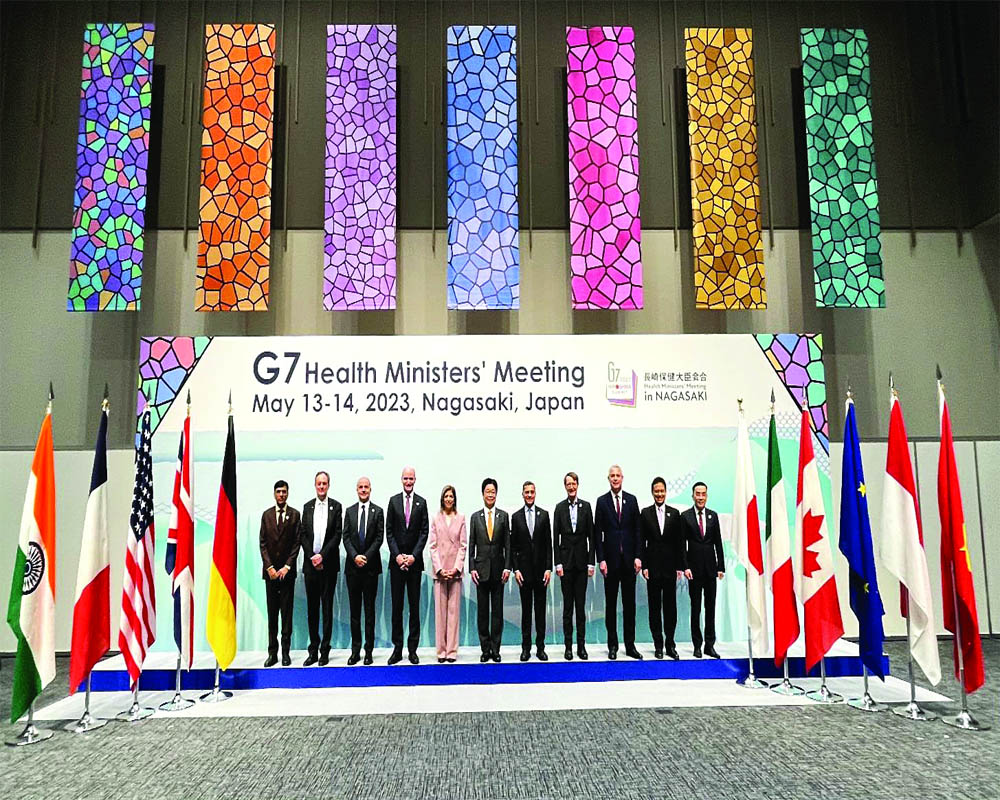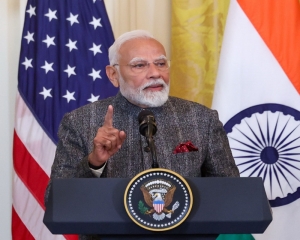India has shown how an inclusive architecture for the overall well-being and healthcare of the people can be achieved
The G7 Summit will brainstorm global issues faced by humanity. Ahead of the summit, health ministers of G7 along with outreach countries – India, Indonesia and Thailand – along with multilateral agencies brainstormed over the issues faced by humanity. The G7 being a group of the most industrialized nations in the world also has the most of the global wealth with them. Needless to say, G7 has an accompanying duty and responsibility to take the lead in addressing global challenges, including the health issues of the world population.
Union Minister for Health and Family Welfare Mansukh Manadaviya attended the meeting of the health ministers of G7 along with outreach nations. India for the past few years has been at the centre stage of the deliberations of G7. Prime Minister Narendra Modi has regularly been attending the G7 meetings. Also, India with the presidency of G20 is currently at the centre stage of a solution-based actionable agenda for the global challenges. The success of the G7 agenda cannot be achieved unless aligned with the aims and objectives cogently brought forth by India with the G20 presidency.
The world is still learning its way out of the Covid-19 pandemic. The once-in-a-century pandemic has made humanity aware of the health risk of an interconnected world. The outbreak of communicable diseases poses a serious challenge to the well-being of the global population. Also, a health issue is directly connected with the global economy. Indian G20 presidency by lending its voice to the Global South has brought forth the concerns of the developing and poor countries of deepening debt, which became acute in the aftermath of the Covid-19 pandemic. It’s in this context that the agenda of G7 and G20 must be aligned.
The G7 must take lessons from the Indian way of dealing with the Covid-19 pandemic, as it can lead the wealthiest nations to contribute constructively by learning from the leadership of PM Modi. The Indian Covid-19 response was based on the principle that none should be left behind in the vaccination drive. All must be vaccinated and India demonstrated that the people living in the remotest parts of the country were also provided with not only access to the vaccines but also psychological and emotional support so that they willingly took the jabs.
Malana is one of the villages in Himachal Pradesh. Tradition claims that the descendants of the army of Alexander had settled in this remote village. The villagers are particular about protecting their unique culture, and they maintain a distance from others. It was a tough task for the health personnel to vaccinate the people of the village. But PM Modi during his several video conferences with the heads of the district administrations had made it clear that none should be left behind in the vaccination drive. The district administration launched a special campaign to convince the people of the village to take the Covid-19 vaccines. Several far-flung villages in the country were covered under the vaccination drive. The administrations even used drones. The frontline workers even went to villages where only one or a very few people lived.
India also lived by its philosophy of ‘Vasudhev Kutumbkam’ that the world is one village and provided indigenous vaccines to countries in all parts of the world, from Brazil to Caribbean nations, from Africa to South Asia. This has to be the guiding principle for G7 when the Summit addresses the issue of equitable access to vaccines against global communicable diseases.
Under the leadership of PM Modi, India has also shown an inclusive architecture for the overall well-being and health care of the people. Ayushman Bharat is worth mentioning here. India issued additional 22 crore Ayushman health cards in 2022 against 13.22 crore cards issued in 2021. Also, the government last year gave coverage of over Rs 50277.4 crores under the Ayushman Bharat scheme. Over 26,000 hospitals have come under the coverage of Ayushman Bharat. India also gave wider access to healthcare through e-Sanjeevani by which people can access doctors through telemedicine.
India rolled out the first in Asia container-based hospitals to help people access healthcare in remote parts of the country. Critical care has also been provided in hospitals in 602 districts of the country. From 387 medical colleges in the country in 2013-14, India now has 648 medical colleges. The Modi government’s emphasis on health care for all has also been attracting foreign direct investments in record numbers. The FDI in the pharmaceutical sector has jumped from Rs 3650 crores in 2019-20 to Rs 14,677 crores in 2022-23.
The G7 Summit can look at the Indian expertise in vaccine development and manufacturing, as well as the knowledge gained during the outbreak of the Covid-19 pandemic to make an actionable plan for the wellbeing of the global population.
(Author is the national general secretary of the Bharatiya Janata Party)



























